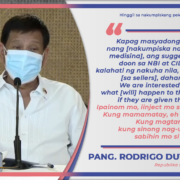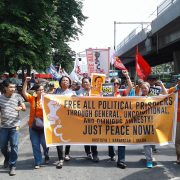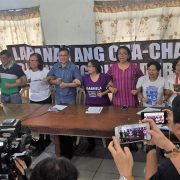Groups on DOJ review of 52 drug war deaths: ‘Paltry, late, tentative’
Human rights group Karapatan urged the Department of Justice (DOJ) to go beyond reviewing and further investigating the 52 cases of alleged extrajudicial killings by police officers under the Rodrigo Duterte government’s drug war.
In response to the DOJ’s reported disclosure of the details of the cases, Karapatan secretary general Cristina Palabay said the public, most especially the families of the victims, deserve clear answers to several questions.
“[W]hat are the patterns in these killings? Who are the perpetrators and from what basis or orders have they conducted the said violations? What are the implications of the policies of the Philippine National Police as well as the President’s pronouncements on such acts” Palabay asked.

In a statement, the DOJ said it concluded its review of 52 cases submitted by the Philippine National Police and its Internal Affairs Service that resulted in deaths during the course of the so-called war on drugs and has referred them to the National Bureau of Investigation.
“These cases are to undergo further investigation and case buildup for the possible filing of charges against erring police officers,” the DOJ said.
The DOJ also said it authorized the release of information concerning the cases for the purpose of informing the families of the victims and to invite witnesses to provide information on the killings.
Palabay however said the DOJ decision is not only too late but is too little.
“Why are only .8% of the 6,151 reported deaths by the Philippine Drug Enforcement Agency being investigated and reviewed?” Palabay asked.
Palabay added the decision can only be mere window dressing by the Duterte administration amid scrutiny by the International Criminal Court and the United Nations Human Rights Council.
“Without establishing the clear patterns of killings, as well as the level of command responsibility and policy issues on these violations, such piecemeal acts do little to render justice and to will and institute genuine policy change,” Palabay said.
National Union of Peoples’ Lawyers president Edre Olalia agreed with Palabay, saying “the paltry number, the inordinate lateness, and the unusual tentativeness” of the DOJ decision may be viewed as “more of going through the motions rather than as a thoroughgoing and proactive desire to decisively stop the carnage and the impunity.
“[W]hy are these extrajudicial killings happening in the first place and why are a puny number of ‘erring police officers’ taking the fall all alone even at this very overdue time?”Olalia asked. # (Raymund B. Villanueva)







